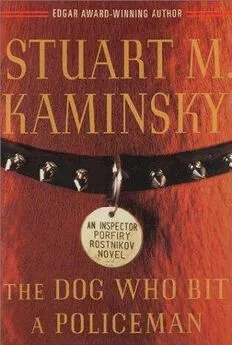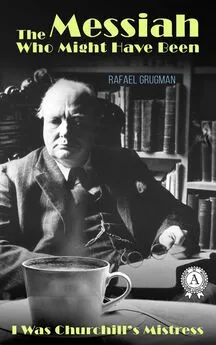Stuart Kaminsky - The Dog Who Bit a Policeman
- Название:The Dog Who Bit a Policeman
- Автор:
- Жанр:
- Издательство:неизвестно
- Год:неизвестен
- ISBN:нет данных
- Рейтинг:
- Избранное:Добавить в избранное
-
Отзывы:
-
Ваша оценка:
Stuart Kaminsky - The Dog Who Bit a Policeman краткое содержание
The Dog Who Bit a Policeman - читать онлайн бесплатно полную версию (весь текст целиком)
Интервал:
Закладка:
“Wait,” said Rostnikov.
“What?”
He held up the now-empty mug and handed it to the little man.
“It was very good. Thank you.”
Pankov nodded and headed in dazed confusion out of the office. He had trouble closing the door behind him and came very close to dropping the mug. But he managed to juggle and catch it before it fell to the floor.
Yaklovev was many things. Corrupt, self-serving, ambitious. He was also loyal to those under him upon whom he depended for his success. Yaklovev was smart, very smart. He was not a man to un-derestimate, and Rostnikov did not intend to do so. Porfiry Petrovich had known his office was monitored two days after the Yak had become director, given Rostnikov a promotion, and assigned him this private office. The microphone was well hidden behind a panel in the ceiling almost directly over the desk. It had taken Rostnikov almost half an hour to locate it. He could have done so faster, but climbing atop the desk with one good leg was an invitation to disaster.
Since Rostnikov respected the director’s intelligence, he doubted if the conversation he just had with Pankov would fool him for an instant. The director would know, when he listened to the tapes, which must now be rolling to record silence, that Rostnikov knew about the microphone.
“Like the old days,” Rostnikov said aloud for the ears of the Yak.
Fifteen minutes later, after he had spoken with Sarah on the phone, Rostnikov and Emil Karpo were on their way to pick up a murderer.
“It’s early,” said Sasha with a yawn, his mind moving quickly to adjust to the unexpected appearance of Boris Osipov. “I thought you were coming at seven tonight.”
“Meeting is earlier,” said Boris. “We’ll pick up the dog now.”
“He may not be ready,” said Sasha. “He needs his rest.”
“Dmitri, let us get your dog. Hurry.”
Sasha had been looking out the hotel room window when Boris had arrived. There was nothing he wanted to do, nothing he wanted to read, nothing he wanted to see, though the television set was on.
When the knock had come, Sasha had picked up a magazine and opened the door. Now he slowly prepared to go with the older man, wondering how he could leave word that he had been forced to leave early.
What is the worst that can happen? he asked himself. Rostnikov and a dozen armed men would simply show up at the dog arena.
Nimitsov and the others would be arrested, and Sasha would hand over the small tape recorder in his pocket which should then have the entire conversation of the meeting he was about to attend. If he was searched, which he doubted he would be, he would simply and readily admit that he was planning to tape the meeting for his own protection. It would be reasonable, coming from the criminal he was supposed to be. For further protection, a gun had been hidden in a sliding tray under the portable dog cage in which he would transport Tchaikovsky. Sasha hoped he would not need the weapon.
And then again, he hoped he would. This man waiting for him and Nimitsov had tried to kill Elena. And for some reason, Sasha was sure they had killed Illya Skatesholkov. They would certainly kill Sasha with very little provocation.
Sasha Tkach had left the room earlier, had an expensive lunch in the hotel, and called Maya at work from a phone booth. In case someone was watching him, Sasha smiled a lot when he spoke and tried his best to suggest that he was speaking to a woman, which he was, but not the kind of woman a watcher might assume. The clerk at Maya’s office said she was not in. He called her at home.
“It’s me,” he said. “Why didn’t you go to work?”
“Because your mother couldn’t stay with the children,” she said.
“She said she had to go see Porfiry Petrovich. Do you know why she had to see him, Sasha?”
The baby started to cry in the background.
“No,” he said, but he knew.
“Are you enjoying your assignment, Sasha?”
“No,” he lied.
“Are you doing dangerous things, suicidal things?”
“No,” he repeated.
“I love you, Sasha.”
“I love you, Maya.”
“I’m leaving you, Sasha,” she said. “I’m taking the children and going back to my family in Kiev.”
“No,” he said finding it difficult to hold his smile and keep his voice down. “Please wait till this assignment is over. We should at least talk before you do something like this.”
“If you change, can prove that you have changed, we will come back. My brother is doing very well in the automobile business. He wants us. He has a job for me. Don’t follow us. I’ll call you. When, and if, I think you have changed, we can talk about our returning.”
It was growing ever more difficult to keep smiling, but Sasha managed. “Wait till I get home,” he said. “I should be finished late tonight.”
“We will be gone by late tonight,” she said. “You feel trapped by us. You will no longer be trapped. Maybe you will find it unsatisfying. Maybe you will feel liberated. We’ll see.”
“Maya,” he said, “have you been with another man?”
“No,” she said.
He believed her. She pointedly did not ask him if he had been with another woman.
“Wait till I get home,” he said, “please. We’ll talk. I can change.”
“Maybe you can, but I don’t think so. I do not want to talk.
Good-bye, Sasha. I do love you.”
“Maya. .”
She hung up.
That was less than an hour ago, and now Boris stood waiting for him in the hotel room. Sasha adjusted his jacket and tie and nodded that he was ready.
Boris drove. Sasha sat in the seat next to him and tried not to look for backup that might be behind him but probably wasn’t. It had been too early. It would be hours before backup came. Nimitsov had said they would be picking Sasha up much later.
At the converted garage at the end of the narrow passageway off the Arbat, Sasha made as much noise as he could, talking loudly to Boris, telling him an off-color story he had actually heard from the mistress of a car-hijacking gang when Sasha had been undercover several years earlier. The woman, with Sasha’s cooperation, had seduced the policeman. Boris was in no mood to laugh at the joke.
He had seen Peter Nimitsov kill Illya Skatesholkov. Boris had no particular fondness for Illya, though they had worked reasonably well together. But Boris did have a fondness for Boris, and if Nimitsov could go wild and kill a man who had simply protected Peter’s prize dog, what might Boris accidentally do that would earn him a bullet in the brain? The baby-faced Nimitsov was definitely getting crazier and crazier. Boris had spent much of the day trying to figure out how he might be able to get some money and go somewhere far away-Canada, Australia, Japan. Hidden in his small apartment was a very legal passport Boris had bought with bribes, for one thousand dollars. One could get a passport by simply applying for one, but that meant long lines and weeks of waiting.
Boris had received his passport in less than a day.
And so Boris was in no mood to laugh at the loud off-color joke he would normally have found funny. And he was too preoccupied to notice that Dmitri Kolk’s voice had grown uncharacteristically loud when he told his joke.
Sasha made as much noise as he could reasonably make as he opened the unlocked door, held it half open, and said something to Boris that he hoped would alert the trainer inside the garage. It did, but the trainer was not doing anything that would have alerted Boris in any case. He was exercising one of the dogs, a German shepherd, in the mesh-surrounded area in the middle of the garage.
“I need Tchaikovsky now,” said Sasha.
The trainer, wearing black denims, a white T-shirt, and thick leather gloves, nodded and climbed into the exercise pen. The shepherd looked up, sensing that his time uncaged was shorter than usual. It was a sensation he did not like. The dog began to growl.
Boris and Sasha stood watching as the trainer slapped the side of his leg. This time the dog trotted to his side.
Less than five minutes later, Boris and Sasha were carrying the cage containing the pit bull to the car. The gun in the tray under the cage was inside a holster firmly taped to keep it from sliding.
Sasha had a fantasy of getting the weapon, shooting Boris, Nimitsov, and anyone else at the meeting, and running to stop Maya from taking the children to Kiev. Kiev wasn’t even safe. People were still dying there from the Chernobyl fallout.
But Sasha knew he would do no such thing, and he had little hope that his wife and children would still be there when he got home.
“Deputy Pleshkov,” Iosef said, “we would like you to accom-pany us back to Moscow.”
Akardy Zelach stood back but forced himself to keep from looking down. Yaklovev himself had, according to Iosef, ordered them to take a car, with a driver, out to Pleshkov’s dacha.
Both policemen anticipated that the confrontation at the end of the journey would not be easy. And it wasn’t.
Pleshkov looked sober, somber, cleaned, and well groomed. This was the Pleshkov of television interviews, the confident man with the smile of understanding.
Pleshkov’s wife stood behind him in the small reception area of the dacha. The son, Ivan, was nowhere in sight.
“No,” said Pleshkov. “I am sorry. I’m too busy. I have a speech to give at the assembly tomorrow. I must get it finished today. A trip to Moscow and then back would interrupt my thoughts and eat too deeply into my time. The day after tomorrow might be possible.”
“Deputy Pleshkov,” said Iosef politely, “this is very important.”
“I’m sorry,” said Pleshkov, looking genuinely sorry.
“May we speak to you in private?” asked Iosef.
“My wife can hear anything you might have to say,” he said.
“Murder,” said Iosef.
“Murder?” repeated Olga Pleshkov.
“Murder? ” said Yevgeny Pleshkov.
“A German,” said Iosef. “Wouldn’t you like to come with us?”
“Perhaps I should,” Pleshkov said with a sigh. “If this is about a murder and you think I may be able to help.”
“What is this, Yevgeny?” Pleshkov’s wife asked.
“You heard the young man,” Pleshkov said. “Apparently a German has been murdered.”
“So?” she asked. “What has that to do with you? Germans are murdered in Moscow all the time. Frenchmen are murdered. Finns are murdered. Americans are even murdered. You are not called to Moscow for every murder. What is so diplomatically significant about this German that your presence is immediately required?”
“That is what I intend to find out, my dear,” said Pleshkov, looking not at her but at Iosef.
When they were in the car watching Pleshkov’s wife through the window, the deputy, seated between Zelach and Iosef, said,
“Would you have arrested me had I refused to come?”
“Yes,” said Iosef.
“I see,” said Pleshkov as the car pulled away onto the dirt road.
“I’m sure we can settle this quickly and I can be back at my desk in a few hours, finishing my speech.”
“I don’t know,” said Iosef, looking forward, as was Zelach. “That will be up to Director Yaklovev.”
Pleshkov turned to look back at his wife standing tall, hands clasped in front of her. Ivan Pleshkov suddenly appeared in the doorway of the dacha. They both watched the unmarked police car head toward Moscow.
Pleshkov looked up at the sky. Still no rain. He had never seen anything quite like this in Moscow. The sky had been dark for days.
Thunder crashed. The wind swirled, but it did not rain. Yevgeny Pleshkov did not believe in omens, but he silently cursed the sky and to himself said, Rain, damn you. Rain.
Читать дальшеИнтервал:
Закладка:










